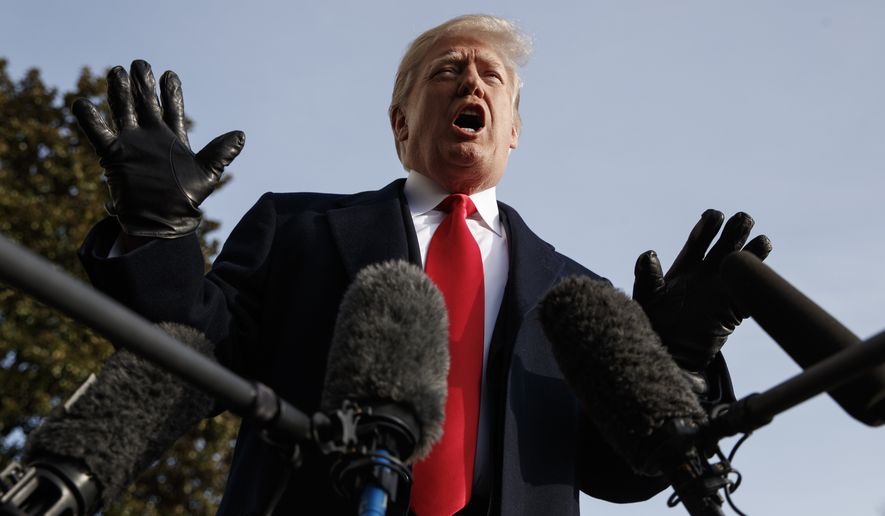Democratic congressional leaders are loath to acknowledge it, but President Trump has them cornered with his threat to terminate NAFTA if his new trade deal with Mexico and Canada isn’t approved.
Scrapping the North American Free Trade Agreement without a replacement would deliver a heavy blow to the U.S. economy. In the short term, it would reduce real U.S. gross domestic product — the total output of goods and services — by as much as $231 billion, more than 1 percent during the first five years, according to an analysis commissioned by the Business Roundtable.
“Terminating NAFTA would have negative impacts on jobs, exports and output even after new supply chains are formed. In this longer run, we estimate that U.S. GDP would remain depressed by over 0.2 percent, permanently,” said the report for the Business Roundtable, an association of chief executive officers from major U.S. corporations.
The impact on the U.S. GDP, about $19.3 trillion in 2017, would depend on the reactions of Mexico and Canada. Alternative scenarios in the analysis pegged the reduced annual GDP at $119 billion to $231 billion, with job losses from 1.8 million to 3.6 million in the five-year window.
Sen. Charles E. Grassley, the Iowa Republican who next year will take charge of the Senate Finance Committee, which oversees trade agreements, said the president has Congress over a barrel.
“It seems to me it is going to force Congress to act — even if you disagree with parts of it,” he said in an interview on the “Adams on Agriculture” program on the American Ag Radio Network.
“Now that is a hard-nosed approach, but sometimes a president has to use that if he wants to get things accomplished,” Mr. Grassley said.
Capitol Hill Democrats shrugged off Mr. Trump’s threat and vowed to tinker with the proposed U.S. Mexico Canada Agreement (USMCA), potentially derailing a deal that legislatures in all three countries must approve.
Mr. Trump and his counterparts in Mexico and Canada signed the agreement on Nov. 30, capping a year of intense negotiations that produced a trade deal that many said would be impossible to make.
Two days after signing the accord in Buenos Aires while the three leaders were attending the Group of 20 summit, Mr. Trump put Congress on notice.
“I will be formally terminating NAFTA shortly,” he told reporters on the Air Force One flight back to Washington. “Then Congress will have a choice of approving the USMCA, which is a phenomenal deal. Much, much better than NAFTA. A great deal.”
The president threatened to rip up NAFTA, which he called the “worst trade deal ever made.” The threat helped force Mexico and Canada to the negotiating table.
Mr. Trump has found more agreement with Democrats than his fellow Republicans in criticizing the 24-year-old NAFTA, which is blamed for shipping jobs to Mexico and hastening the demise of U.S. manufacturing.
But Democrats, who take control of the House next month, have been less than enthusiastic about approving an agreement that would allow Mr. Trump to check off a major campaign promise.
The USMCA sets new rules on agriculture, technology and auto imports, protects autoworkers’ jobs in the U.S. and opens Canada to American dairy products.
House Minority Leader Nancy Pelosi, the California Democrat who is poised to become speaker of the House, described the new pact as a warmed-over NAFTA that doesn’t go far enough.
She joked that it was “the bill formerly known as Prince,” a reference to the late musician who once changed his name to an unpronounceable symbol.
Mrs. Pelosi said Democrats will fight for measures to accompany USMCA that enforce labor and environmental requirements, as well as legislation in Mexico to address wages and working conditions.
“I said it was a work in progress,” she said. “I know it’s work; I hope it’s progress.”
Rep. Bill Pascrell Jr. of New Jersey, the top Democrat on the House Ways and Means Committee’s trade panel, said he doesn’t believe Mr. Trump would carry out the threat.
“He’s not someone I take at his word. Trump boasted about what a great deal the USMCA was, yet a day after signing is resorting to threats to force Congress’ hand,” he said. “This doesn’t display confidence in the deal he made. I have more confidence in Congress continuing to work with [U.S. Trade Representative Robert Lighthizer] than it would seem Trump does.”
Mr. Pascrell also called the agreement an “ongoing process.”
“Continuing the status quo of NAFTA is not an option. Too many jobs have been outsourced and wages lost to let the old agreement stand,” he said. “But simply withdrawing won’t do anything to raise wages here or in Mexico or reverse NAFTA’s destruction.”
Mr. Trump has the authority to terminate the deal under NAFTA’s Article 2205, which is the exit clause for member countries. Invoking it would begin a six-month waiting period before Mr. Trump could quit the deal.
Invoking Article 2205 would impose a six-month deadline on Congress to approve USMCA or revert to trade laws that were in effect in 1993 before NAFTA.
Congress might test Mr. Trump’s resolve, but the president has insisted that the U.S. would be just fine without NAFTA.
• S.A. Miller can be reached at smiller@washingtontimes.com.




Please read our comment policy before commenting.